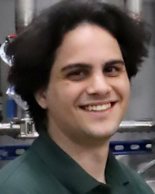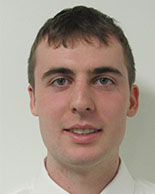MSU Cryogenic Initiative
Read testimonials about the MSU Cryogenic Initiative from current and former students enrolled in the program.
The Cryogenic Initiative academic thesis at MSU
In FRIB’s Cryogenic Initiative program, master’s and PhD level candidates work within a research group or on a specific project as part of their academic thesis.
All student research is possible because of the technology available at FRIB.
Real-world examples from Cryogenic Initiative participants
- Duncan Kroll (MS)
- Topic: Development of the Mechanical Design for a Freeze-out Purifier
- Defense date: 3/20/20
- Current position: PhD student, FRIB
- Tasha Williams (PhD)
- Topic: Investigation into the Performance of Twin-Screw Compressor for Helium Compression
- Defense date: 4/26/22
- Current position: Compressor engineer, Trane Technologies
- Topic: Investigation into the Performance of Twin-Screw Compressor for Helium Compression
- Jonathon Howard (PhD)
- Topic: Characterization of a Cryogenic Centrifugal Compressor Train for Reliable Wide-Range Operation of Helium Sub-Atmospheric Systems
- Defense date: 3/21/24
- Current position: Cryogenic process engineer, FRIB
- Topic: Characterization of a Cryogenic Centrifugal Compressor Train for Reliable Wide-Range Operation of Helium Sub-Atmospheric Systems
The MSU Cryogenic Initiative combines classroom education with training on cutting-edge technologies and advancements in the cryogenic field that exist and are being implemented at FRIB.
Below are testimonials from some of the program’s current students.
 Jack Bacjz is majoring in mechanical engineering at Michigan State University. He is assisting with the mechanical engineering of the FRIB cryogenic systems. His advisors are Andre Benard, a professor of mechanical engineering from the MSU College of Engineering, and Nusair Hasan, adjunct professor of engineering at FRIB. Jack joined the MSU Cryogenic Initiative in winter 2025.
Jack Bacjz is majoring in mechanical engineering at Michigan State University. He is assisting with the mechanical engineering of the FRIB cryogenic systems. His advisors are Andre Benard, a professor of mechanical engineering from the MSU College of Engineering, and Nusair Hasan, adjunct professor of engineering at FRIB. Jack joined the MSU Cryogenic Initiative in winter 2025.
What are your research responsibilities?
My current research responsibilities include creating fabrication drawings for equipment to be used in future purifier experiments as well as developing computer models to better predict the performance of freeze-out purifiers.
How do you think participating in the MSU Cryogenic Initiative will benefit your career?
The Cryogenic Initiative program will benefit my career by giving me the opportunity to work at a leading accelerator facility. This experience will provide the background to stand out in the job market after graduation.
What career path do you plan to pursue at this point?
I plan to pursue a career as a cryogenics engineer, supporting all kinds of research.
What interested you about pursuing this educational path?
When I was looking into graduate degrees in cryogenics, the Cryogenic Initiative program stood out due to the certification in large-scale cryogenic systems. I was interested in this opportunity to be specifically trained in this field instead of adapting a curriculum to suit my research interests.
Would you recommend to other students this program? Why?
I would recommend the Cryogenic Initiative program to other students. It offers a place at the cutting edge of research in our field. You work with experts on impactful projects you can’t do anywhere else.
 Scott Anthony is majoring in mechanical engineering at Michigan State University. He is assisting with the mechanical engineering of the FRIB cryogenic systems. His advisors are Abraham Engeda, a professor of mechanical engineering from the MSU College of Engineering, and Nusair Hasan, senior cryogenics engineer at FRIB. Scott joined the MSU Cryogenic Initiative in fall 2020.
Scott Anthony is majoring in mechanical engineering at Michigan State University. He is assisting with the mechanical engineering of the FRIB cryogenic systems. His advisors are Abraham Engeda, a professor of mechanical engineering from the MSU College of Engineering, and Nusair Hasan, senior cryogenics engineer at FRIB. Scott joined the MSU Cryogenic Initiative in fall 2020.
What are your research responsibilities?
As an engineering student at MSU, I was attracted to NSCL/FRIB. As soon as I found out about FRIB, I applied for a position at the lab. When I was awarded an interview during my sophomore year, I learned about cryogenics and the MSU Cryogenic Initiative, and I instantly knew the initiative was something I wanted to be a part of. Additionally, cryogenics is a unique and interesting field that I am eager to learn more about, especially from leaders in the field and all of those associated with the MSU Cryogenic Initiative.
How do you think participating in the MSU Cryogenic Initiative will benefit your career?
I have gained experience working under deadlines and working under pressure. Working closely with engineers has also taught me how many engineers work, plan, and perform tasks. These experiences will continue to benefit my career as an engineer.
What career path do you plan to pursue at this point?
At this point, I plan to continue to be a part of the MSU Cryogenic Initiative until I obtain my bachelor’s degree in mechanical engineering. I currently would like to stay in the program and achieve my master’s degree.
Where you are in the program so far, what is the best part or what are you enjoying and/or learning the most? What has been most rewarding?
I am a junior mechanical engineering student at Michigan State University. My position in the program so far is applying what I learn in class to matters that occur at the FRIB, working with SolidWorks, learning how to read and develop piping and instrumentation diagrams (P&ID's), learning different equipment and parts, as well as learning about what it takes to work for a world class laboratory. The best part is learning about aspects of engineering and running a lab that I would otherwise not have the opportunity to learn. Thus far, I have enjoyed leaning how to read and write P&ID’s as well as how to carry out a pneumatic pressure test. Continuing to learn and meet people at FRIB has been the most rewarding aspect of the MSU Cryogenic Initiative.
Would you recommend to other students this program? Why?
I would highly recommend this program to other students who are serious about their studies and who are eager to learn about cryogenics, a subject that is otherwise not taught in class. You will gain many experiences during your time in the Cryogenic Initiative that will apply to the private sector, as well as experiences you will only gain by working for a world-class laboratory, like FRIB. If the MSU Cryogenic Initiative is something you want to be a part of, do not hesitate to apply.

